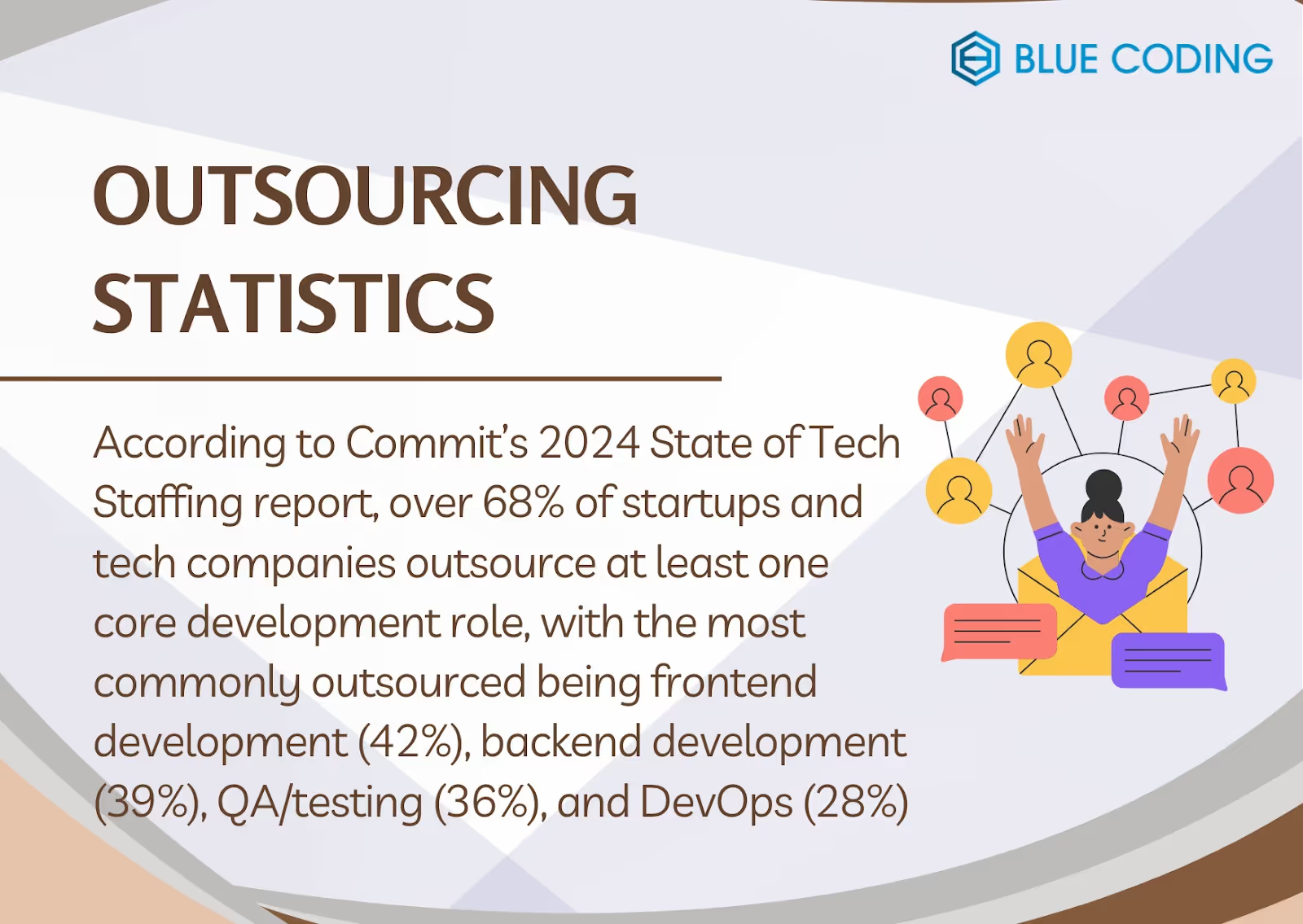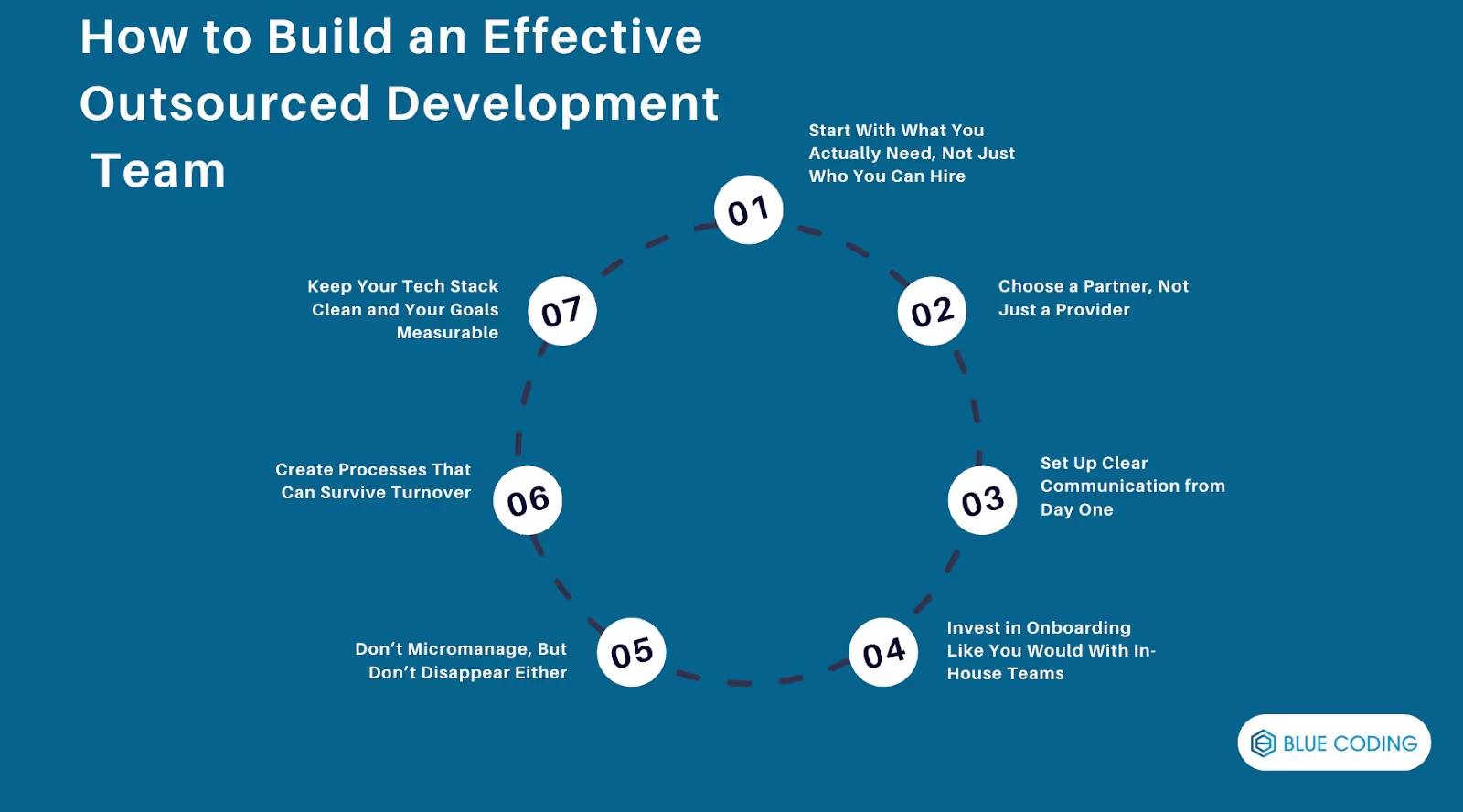When it comes to cost-effective development strategies, outsourcing will always come up at the very top of the list. This practice is extremely popular, with recent statistics showing that, across various sectors, an average of almost 60% of organizations outsource their development solutions. Now, there are different outsourced development roles a company could choose to hire. This blog post will help you identify the key ones and better assess if they’re a good match for your outsourcing needs. Keep reading to find out about the most popular outsourced development roles!
An outsourced development team refers to a group of professionals or developers who are hired by a company or organization from an external service provider or outsourcing company to handle specific development projects or tasks. Rather than maintaining an in-house team, the company delegates the development responsibilities to the outsourced team, located in a different country or region - usually a nearshore one.
For companies in need of an outsourced development team, this typically consists of individuals with expertise in various development roles such as web development, mobile app development, software engineering, or other specialized areas. These IT professionals work remotely and collaborate with the client company through communication tools and project management systems to deliver the required development services or solutions. Outsourcing development teams provide businesses with access to a diverse range of skills, cost-efficiency, scalability, and flexibility in managing their development projects.
Web developers are one of the most popular outsourced development roles out there. They design, code, and modify websites, ensuring a user-friendly design and clear navigation. Due to the ever-encompassing nature of web presence in today's businesses, this role is frequently outsourced to save on costs and leverage international talent as the tasks required are usually quite considerable.
Mobile app developers are instrumental in creating software for various mobile platforms, including the popular iOS and Google Play. The rise in mobile usage has propelled this role into high demand, and now businesses often outsource app development to benefit from diverse expertise and cost efficiencies.
UI/UX designers improve the user interface and overall experience on a variety of digital platforms. Their role directly impacts customer satisfaction and engagement. Since this role requires specialized skills, it's often outsourced to get the best talent without geographical constraints during the hiring process.
Front-end developers work on everything visible to users on digital platforms. Despite being integral to user experience, their role is often outsourced due to the broad availability of skilled developers worldwide and the ability to complete the job remotely without incurring in offie-maintenance costs.
Back-end developers are responsible for server-side web application logic. They ensure that everything works smoothly behind the scenes. Businesses frequently outsource this role because it doesn't require in-person presence and can thus be performed by skilled professionals anywhere in the world.
Full-stack developers juggle both front-end and back-end development. Their comprehensive skill set makes them highly valuable. Outsourcing this role enables businesses to gain from their wide range of expertise without having to accommodate a full-time position.
Software engineers design, develop, test, and maintain software systems. Their work is fundamental in creating efficient digital operations. This role is often outsourced due to its project-based nature and the high availability of talented software engineers globally.
Data scientists convert raw data into meaningful insights that can drive decision-making processes. Outsourcing this role allows businesses to access top-notch data analysis skills on a project basis without committing to full-time salaries.
DevOps engineers work on improving collaboration between development and operations teams, optimizing productivity. Their versatile skillset makes them popular candidates for outsourcing, as their services can be contracted on a need basis.
QA analysts ensure that software products are of high quality by identifying bugs and issues before they reach consumers. These roles are often outsourced as they don't require physical presence, making them ideal for remote work conditions.


Before you even think about hiring developers, get brutally clear on your project scope, goals, and timeline. Too many companies jump into development outsourcing thinking they just need “extra hands”, but that mindset leads to mismatches and chaos. Are you building an MVP? Scaling an existing product? Trying to reduce time-to-market? Your “why” dictates who you need, backend specialists, frontend engineers, DevOps experts, QA testers, and how to structure your team. Think of this stage as setting the rules of the game. If your goals are fuzzy, don’t expect the team to deliver clarity for you.
Outsourcing works best when it feels like an extension of your internal team, not a transactional relationship. That’s why choosing the right development partner is everything. Look for agencies or firms that are genuinely interested in your business, not just your tech stack. Do they ask about your user base? Do they question your roadmap? Do they challenge your assumptions? The best outsourcing partners are opinionated, in a good way. They don’t just nod along; they collaborate, refine, and bring smarter suggestions to the table.
If you’ve worked with an outsourced team before, you already know this: Communication can make or break the project. It’s not about having daily Zoom calls, it’s about clarity. Set up a shared project management tool. Decide on update frequencies. Assign a clear point of contact. Most importantly, it will create a culture of openness where questions are welcomed. When communication is baked into the process, you prevent small missteps from turning into big delays.
Here’s where many companies go wrong, they onboard outsourced teams like freelancers, not teammates. If you want alignment, context is everything. Walk them through your product vision, your customer personas, your tone of voice, even the things you think they don’t need to know. The more aligned they feel with your company culture and product goals, the better their decisions will be. Great outsourced teams don’t just follow instructions, they anticipate needs. But that only happens when they feel like insiders.
Development outsourcing isn’t about handing off the entire project and checking in once a month. But it’s also not about breathing down their necks either. You need to find that middle ground, where you give them autonomy, but also offer feedback and direction at key milestones. Set up sprint reviews. Provide real-time feedback. Ask questions that provoke better outcomes. Think of yourself as the product owner, not the taskmaster. When both sides bring clarity and accountability, momentum builds.
Let’s be real, people move on, even in great teams. That’s why your outsourced development team's work process should never rely on one person’s memory or expertise. Ask your team to document decisions, workflows, and architecture as they go. Use tools like Confluence, GitHub wikis, Loom walkthroughs, whatever works. Build a process that’s transparent and repeatable. That way, if a developer rolls off, someone new can roll in without everything falling apart.
A bloated tech stack and vague KPIs are poison for outsourced teams. Be intentional about the tools you use and the results you expect. What’s the definition of “done”? How are you measuring success? What technical debt are you willing to accept, and what’s non-negotiable? The clearer you are with these things, the better decisions your developers will make. Outsourced teams thrive in structured environments where quality and velocity aren’t at odds.
If you’re ready to tap into the benefits of outsourcing development roles, at Blue Coding we are here to help. As a leading outsourcing company specializing in providing top-notch development talent to businesses worldwide, we can help you build an outsourced development team with ease. With a proven track record of delivering high-quality results, our Blue Coding recruitment team can be your go-to partner for finding and hiring outsourced development roles that perfectly match your requirements. We count on an extensive network of highly skilled and experienced developers across various domains to help you find talent faster. Our recruiters will connect you with the right talent whether you need web developers, mobile app developers, software engineers, or any other outsourced development roles. Contact us today to schedule a free strategy call and learn more about our nearshore development services!
Subscribe to our blog and get the latest articles, insights, and industry updates delivered straight to your inbox